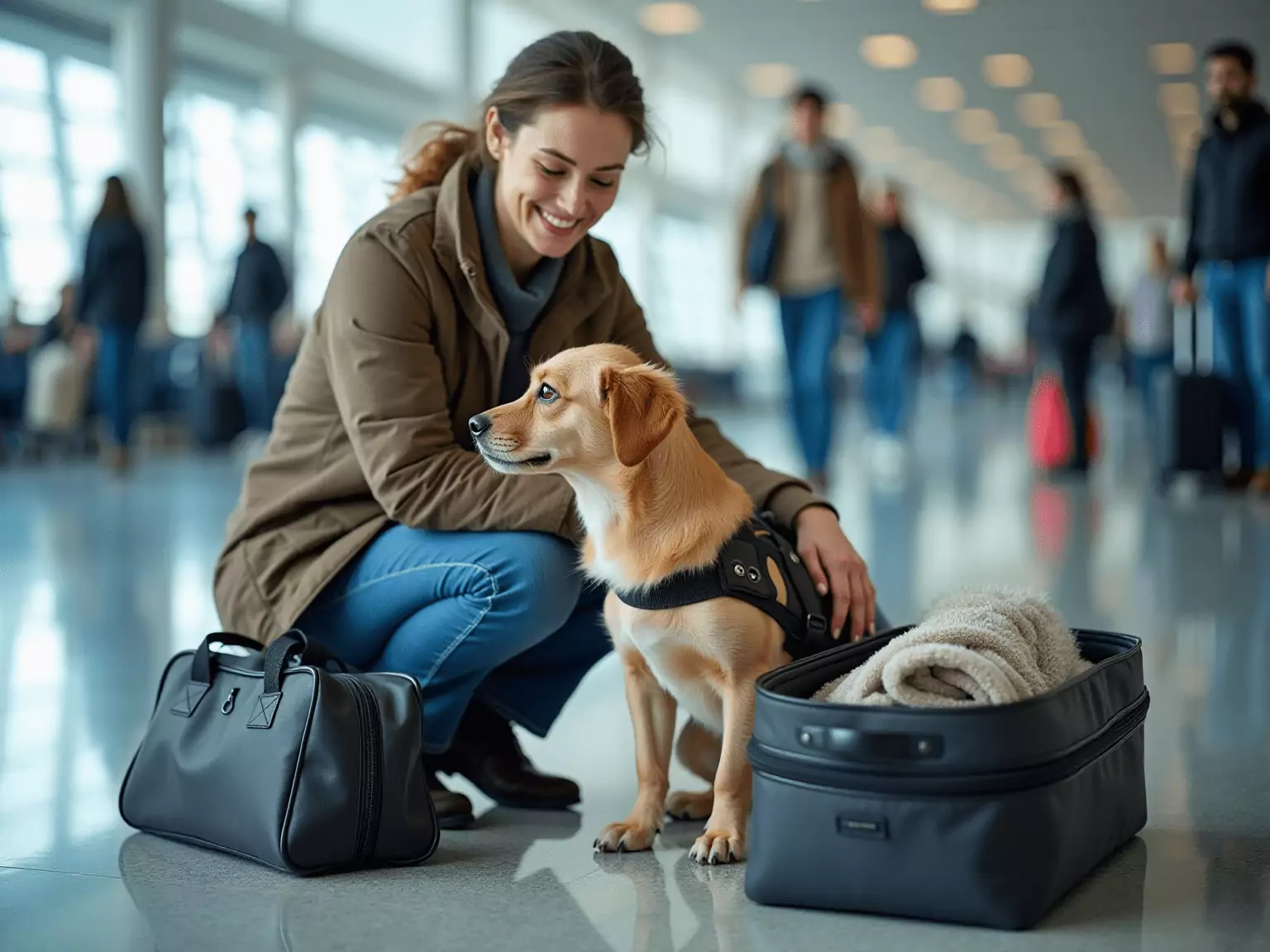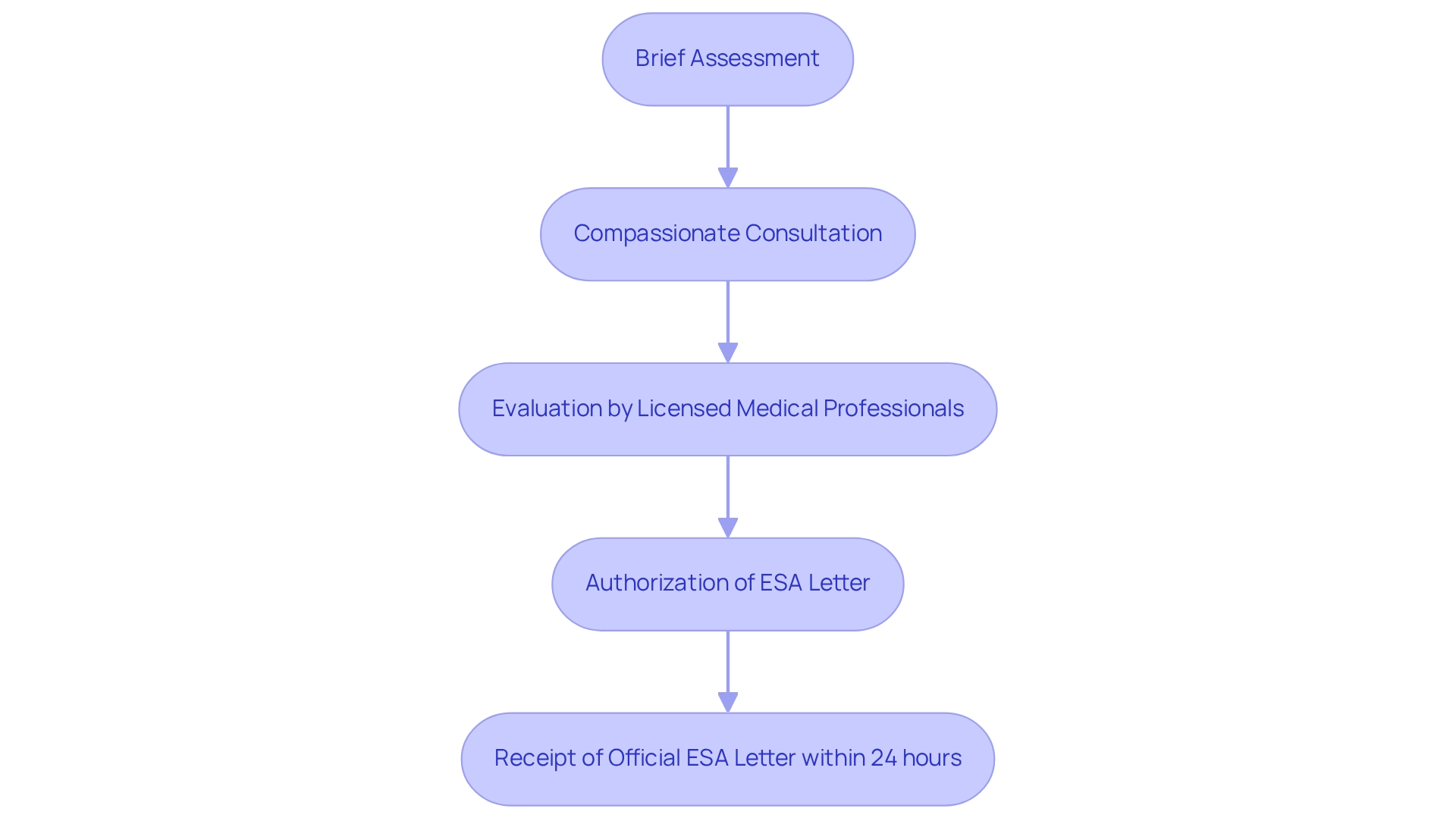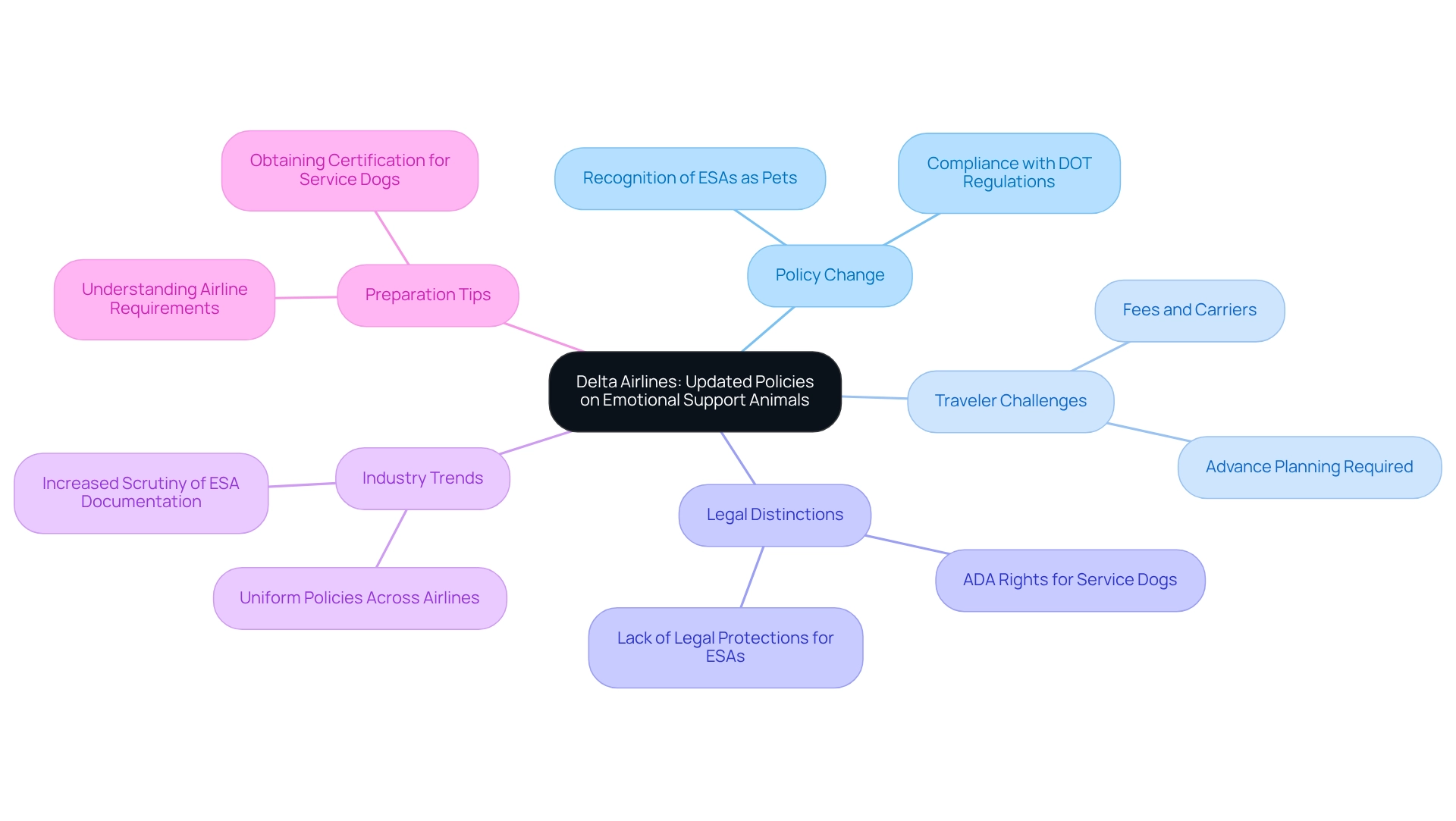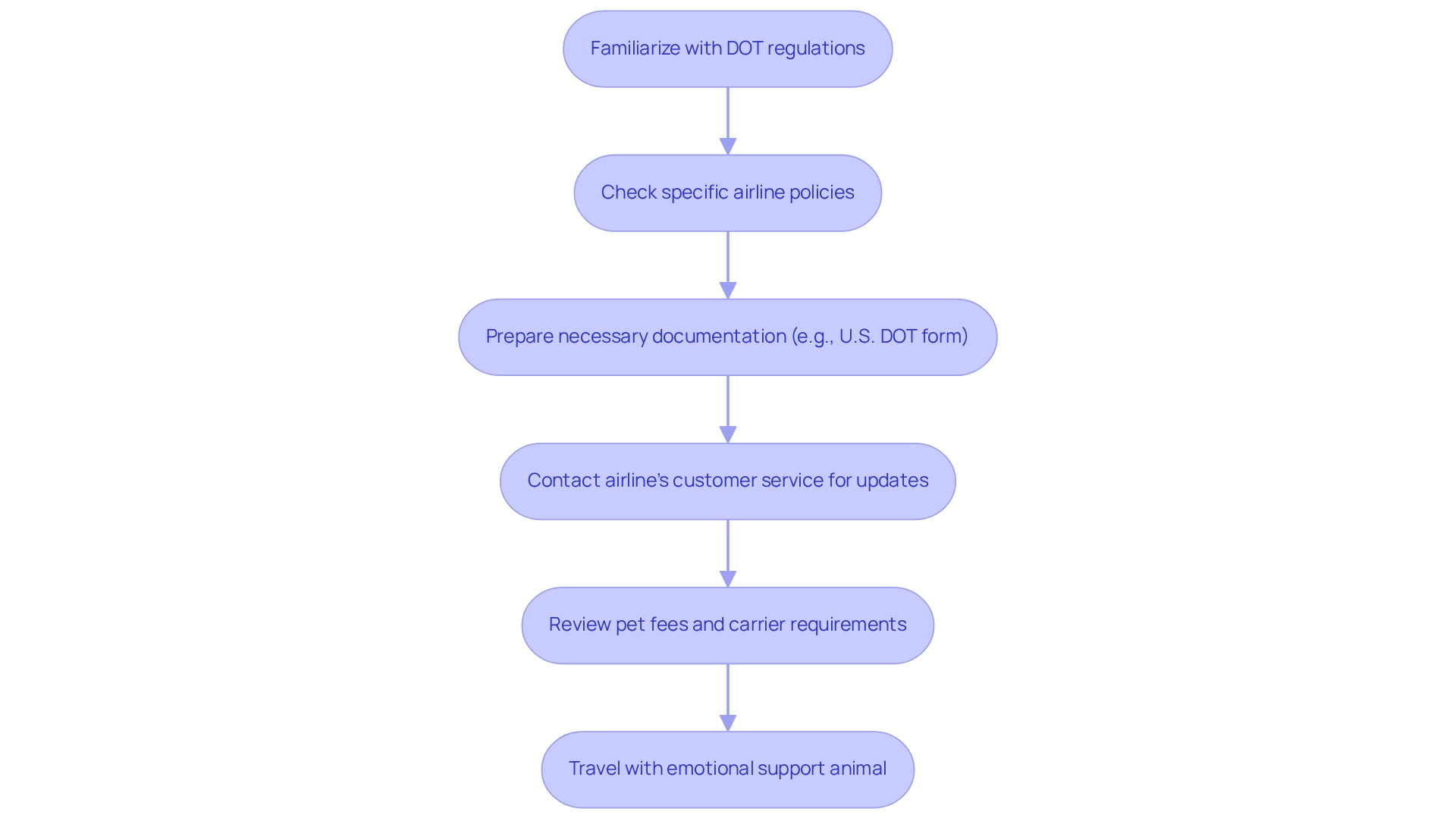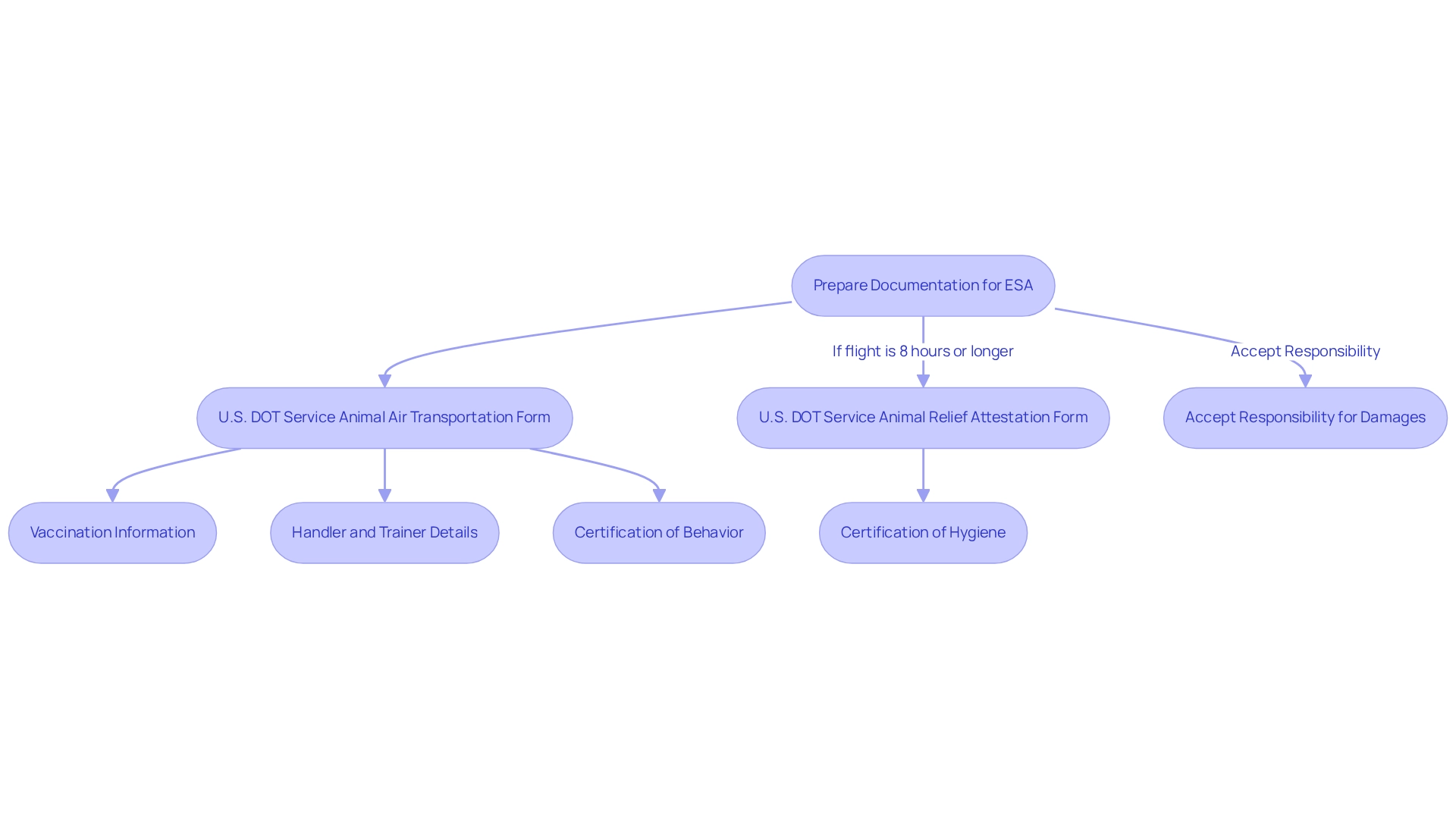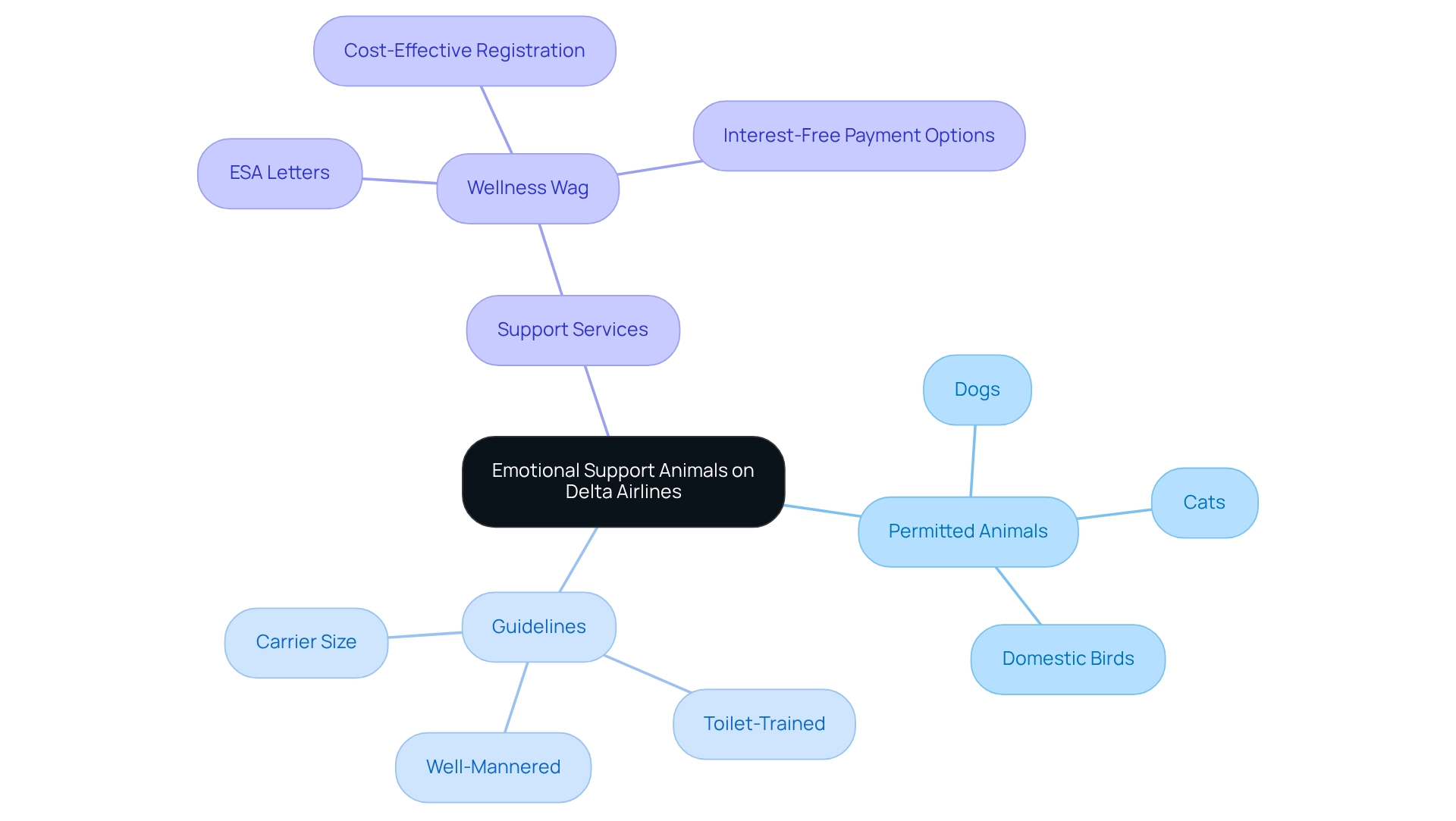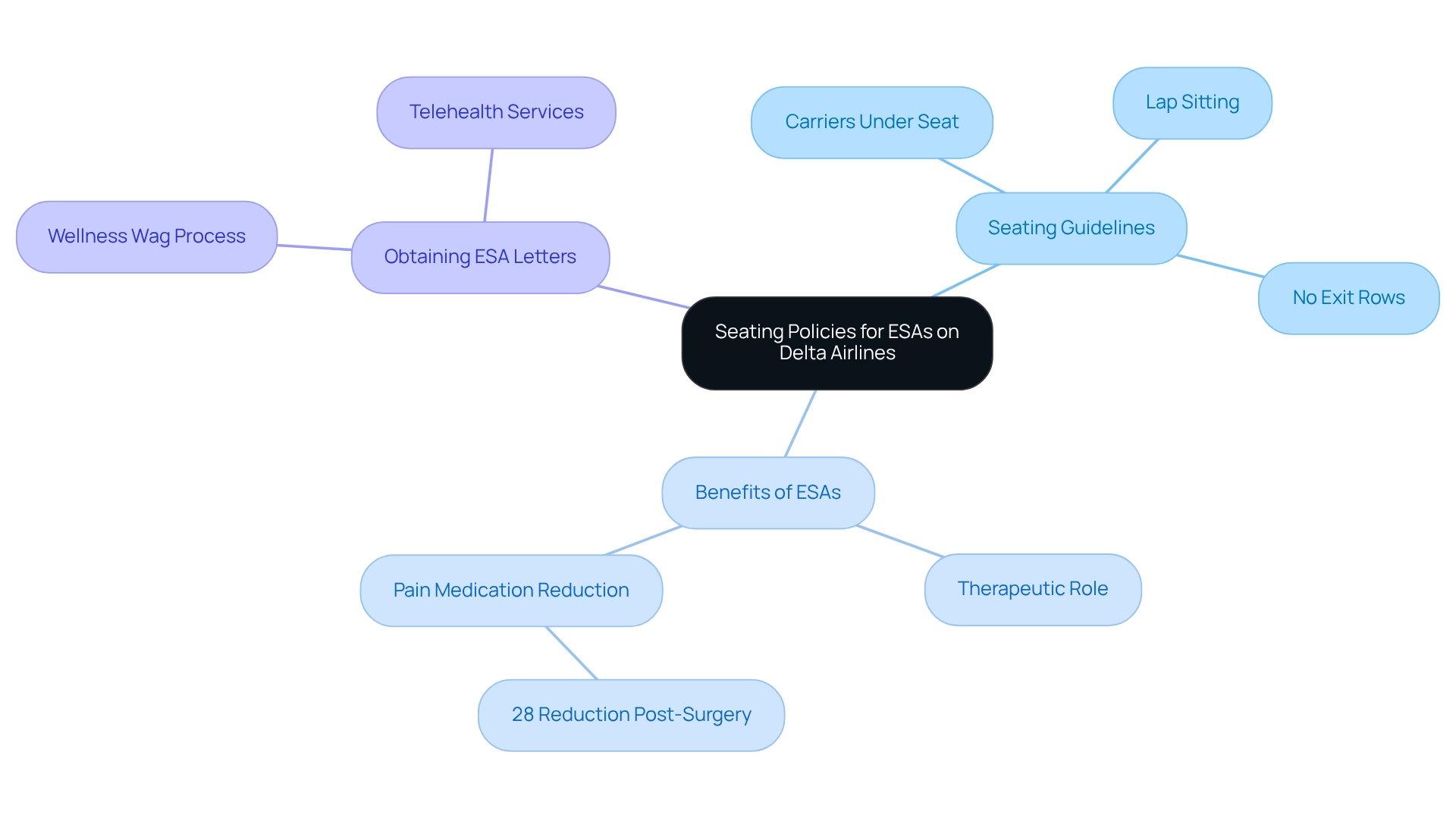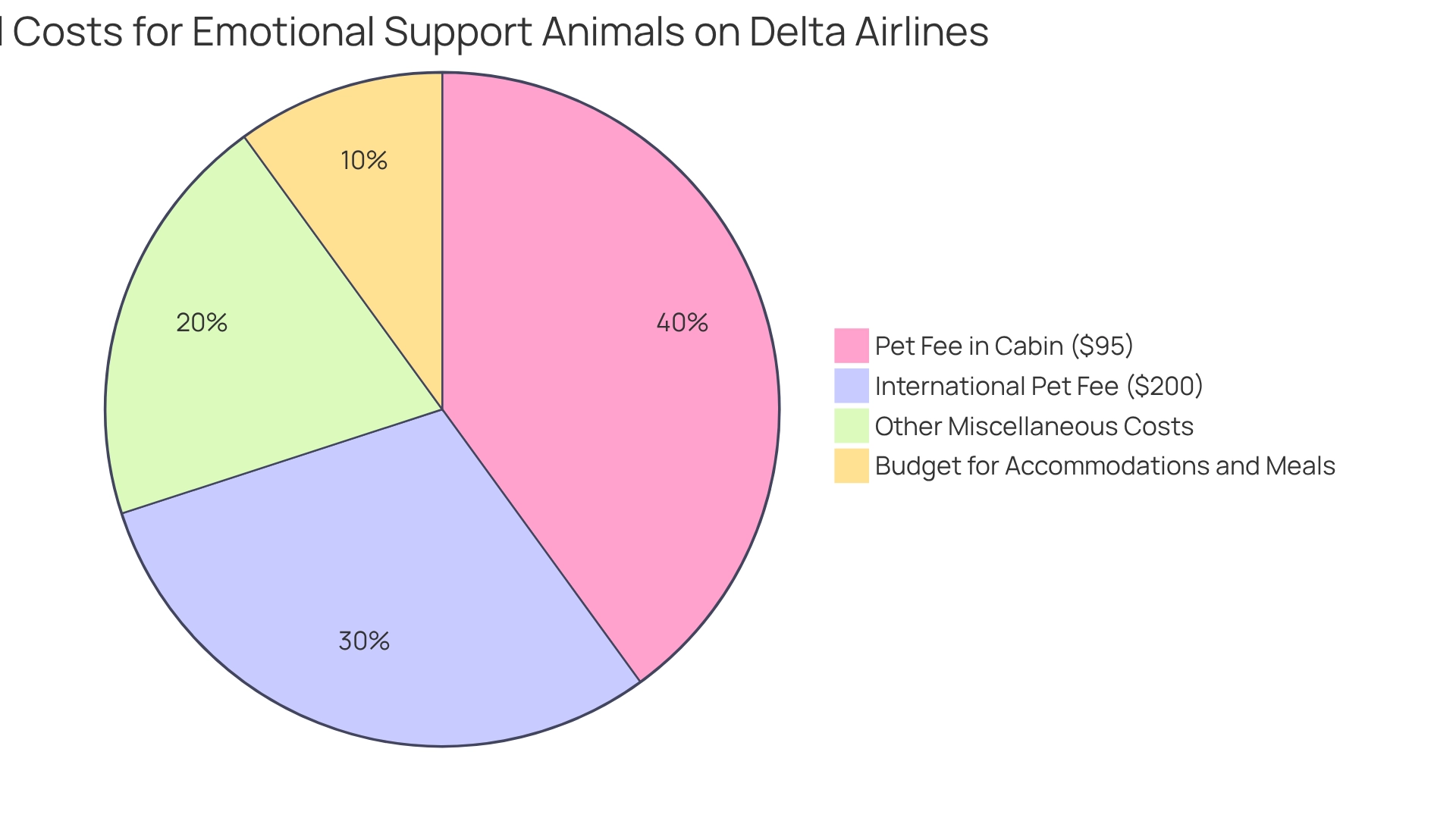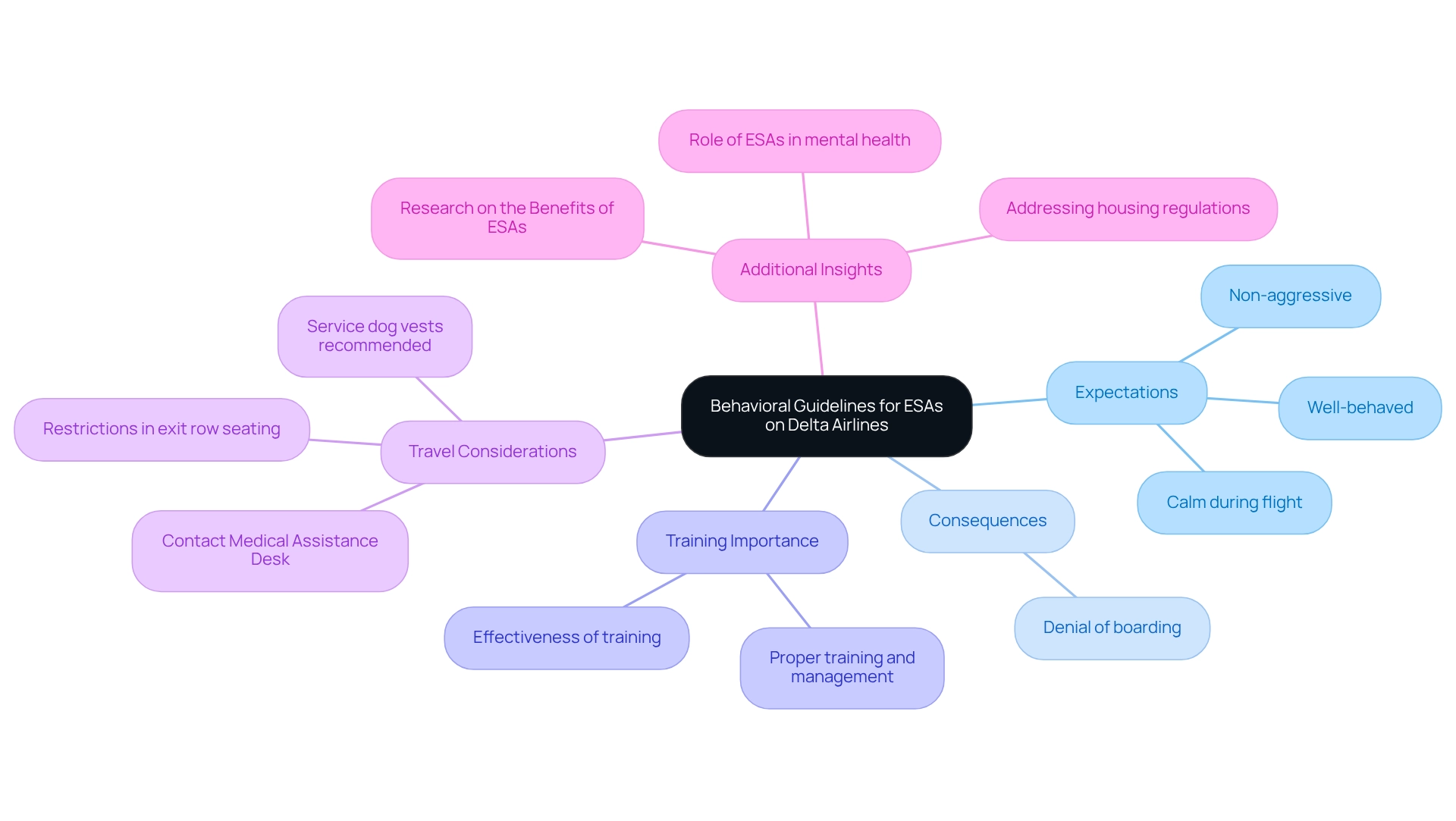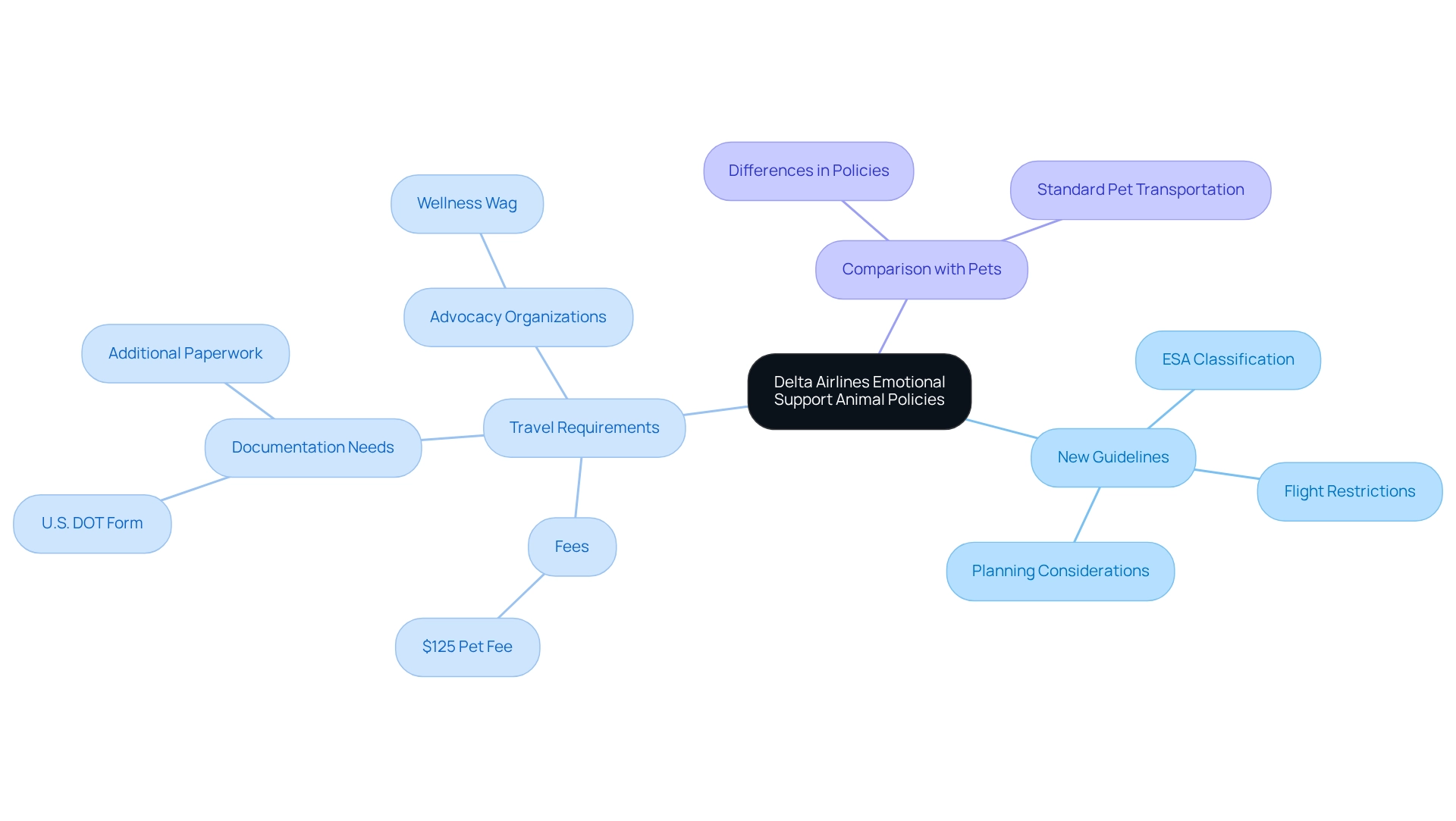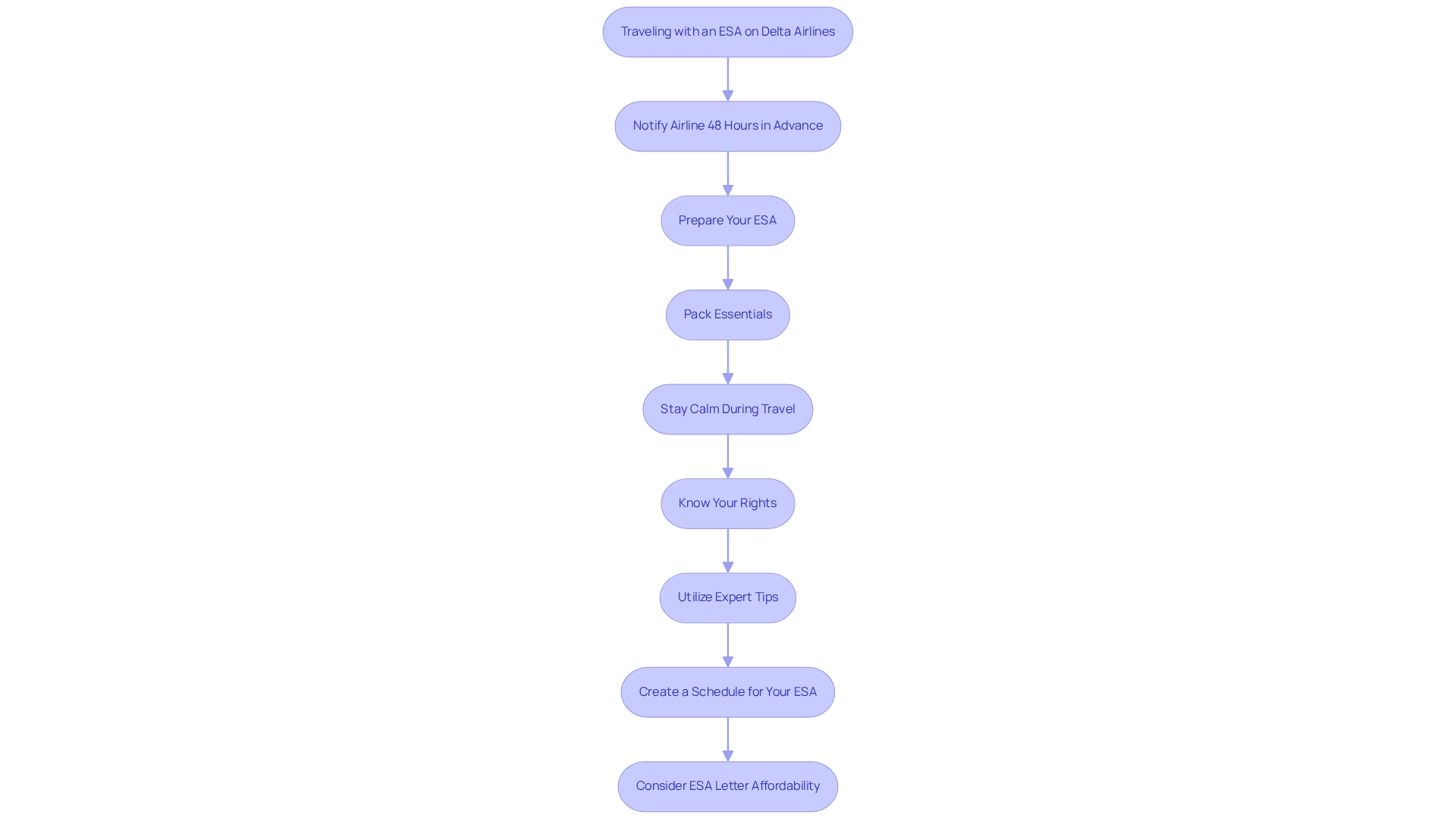Overview
Traveling with an emotional support animal (ESA) on Delta Airlines can be a daunting experience, especially for those navigating the complexities of mental health challenges. It’s essential to understand the updated policies that now classify ESAs similarly to pets, which means proper documentation and adherence to specific guidelines are necessary. This can feel overwhelming, but preparing in advance can make a significant difference.
Imagine the comfort your ESA provides during stressful travel moments. By notifying the airline ahead of time, obtaining the necessary ESA letters, and ensuring compliance with behavioral and carrier requirements, you can create a smoother travel experience not just for yourself, but for your beloved animal as well. This preparation is not just about following rules; it’s about ensuring that both you and your ESA can travel with peace of mind.
Remember, you are not alone in this journey. Many individuals face similar struggles, and the support available through ESAs can be a vital part of your travel experience. By taking these steps, you are prioritizing your emotional well-being, allowing you to focus on the journey ahead. Your ESA is there to support you, and with the right preparations, you can embark on your travels together with confidence.
Introduction
In the ever-changing world of air travel, navigating the journey with an emotional support animal (ESA) can feel overwhelming, especially with the recent policy changes from major airlines like Delta. Many individuals face emotional challenges that can make travel daunting, and understanding the vital role of ESAs in mental health support is crucial. Wellness Wag is here to help, offering streamlined services for obtaining ESA letters, allowing you to secure the necessary documentation to travel with your beloved companion.
This article explores the complexities of traveling with ESAs on Delta Airlines, covering:
- Updated policies
- Required documentation
- Behavioral guidelines
- Fees
Our goal is to equip you with the knowledge needed for a smooth and compliant travel experience, ensuring you feel supported every step of the way.
Wellness Wag: Streamlined ESA Letter Services for Delta Airlines Travelers
At Wellness Wag, we understand the emotional challenges that many individuals face, especially those dealing with mental health issues. The journey can often feel overwhelming, particularly when it comes to traveling. That’s why we offer a streamlined and user-friendly platform for obtaining emotional support animal Delta Airlines letters, which are essential for travelers flying with the airline. The process begins with a brief assessment to determine eligibility, followed by a compassionate consultation with licensed medical professionals who evaluate your unique needs. Once authorized, you can expect to receive your official ESA letter within 24 hours, ensuring you have the necessary documentation to travel with your beloved pet.
Having an ESA can significantly ease the burdens of travel and life. Recent statistics reveal that:
- 41% of people without an ESA reported their mental health worsened during the pandemic.
- Only 21% of ESA owners experienced a decline in their mental health.
This stark contrast highlights the critical role that ESAs play in supporting individuals facing mental health challenges. Wellness Wag has proudly served over 50,000 patients, demonstrating our dedication to providing prompt and compliant services for emotional support animal Delta Airlines letters that enhance the travel experience for those who depend on the companionship of their emotional assistance animals.
When you place an order, you’ll receive a confirmation email detailing your purchase, which is crucial for tracking your order. This service is especially beneficial for individuals facing housing restrictions or transportation challenges due to mental health conditions, as it complies with legal standards under the Fair Housing Act and Air Carrier Access Act.
As one satisfied client, Linda S., shared, “Applying for an ESA through Wellness Wag was the best decision I made. It was an effortless process and the team was very professional.” This sentiment reflects the positive impact that our services can have on your life. We are here to support you every step of the way, ensuring that you feel cared for and understood.
Delta Airlines: Updated Policies on Emotional Support Animals
As of January 11, 2021, Delta Airlines has ceased to recognize emotional support animals as service beings, in accordance with the U.S. Department of Transportation’s regulations that categorize ESAs as pets instead of helpers. This significant policy change means that travelers must now follow the same guidelines as those traveling with standard pets, which includes paying applicable fees and ensuring their pets are transported in approved carriers.
This shift can understandably create additional challenges for travelers, complicating their journeys. Many airlines, including Delta, have revised their policies to comply with these new regulations, leading to a more uniform approach across the industry. Consequently, there is now increased scrutiny of ESA documentation and a heightened emphasis on the necessity of proper carrier specifications.
Delta Airlines has expressed that these changes aim to enhance safety and comfort for all passengers. As Jonalyn Dionio insightfully noted, “Comprehending and addressing obstacles related to housing regulations and mobility limitations remains essential for ensuring individuals obtain the assistance they require.” It’s important to recognize that while service dogs enjoy complete public access rights under the Americans with Disabilities Act (ADA), emotional support animals do not share the same legal protections, which can lead to confusion among travelers.
Therefore, those traveling with ESAs should prepare for potential hurdles, including the need for advance planning and a clear understanding of the specific requirements set by the airline. Obtaining certification or documentation for service dogs can lend credibility and ensure these animals meet certain training standards. Although this is not a requirement for ESAs, it can be beneficial in navigating movement restrictions.
In summary, Delta Airlines’ updated policies reflect a broader trend in the airline industry, where emotional support animals are now viewed similarly to pets. This change underscores the importance of being aware of airline regulations to ensure a smooth journey with an emotional support animal. Furthermore, the global presence of service dogs illustrates the diverse cultural attitudes and economic factors that influence the demand for ESAs, providing context for the policy changes at Delta Airlines within a larger framework.
DOT Regulations: Changes Affecting Emotional Support Animals in Air Travel
The U.S. Department of Transportation (DOT) has implemented new regulations that significantly alter the journey environment for emotional support animal delta airlines. Beginning in 2025, airlines will no longer be required to treat ESAs as service animals, meaning these beloved companions will now be categorized similarly to regular pets. This change necessitates that travelers familiarize themselves with each airline’s specific pet policies, which may include additional fees and carrier requirements. For instance, Air Canada has ceased to recognize emotional support pets, although psychiatric service dogs can still travel with the appropriate documentation, including a completed U.S. DOT form and notification to the Medical Assistance Desk 48 hours prior to the flight. This shift has triggered a wave of adjustments across the airline industry, prompting many airlines to revise their policies regarding emotional support animal delta airlines in accordance with the new regulations.
In light of these changes, it is essential for travelers to grasp the implications of the DOT’s regulations. The proposed certification process for ESA assessments aims to establish clearer standards, ensuring that ESAs genuinely meet the needs of individuals with disabilities. This framework encompasses:
- Clinician training
- Client assessment
- Evaluation of pets
- Interaction assessment
These elements could alleviate compliance challenges faced by travelers. Understanding how this process may influence the endorsement of ESAs for travel is crucial for those who depend on their companions for emotional support.
Statistics reveal that emotional support animals are prescribed for a range of mental health issues, including anxiety, panic attacks, sleep difficulties, depressive episodes, and phobias. These figures highlight the vital role of ESAs in providing mental health support, particularly in light of the recent regulatory changes that have raised concerns among travelers who rely on these animals. Experts stress the importance of checking with airlines directly for the most current policies, as these can vary significantly. Kathryn Anderson, a Senior Marketing Associate, advises, “We encourage those who need more information to visit their airline’s website or contact their customer service department for the most up-to-date details available.”
Ultimately, the DOT’s new regulations seek to enhance fairness in air transportation for individuals with disabilities, yet they also require that passengers with ESAs remain informed and prepared to navigate the evolving landscape of airline policies. Wellness Wag is dedicated to supporting clients during this transition, ensuring they possess the necessary documentation and guidance to advocate for their rights under the new regulations. Moreover, travelers should be mindful of Air Canada’s pet fees and carrier requirements, which are crucial for ensuring a smooth travel experience.
Required Documentation: What You Need to Fly with an ESA on Delta Airlines
Traveling with an emotional support animal Delta Airlines can be a daunting task, especially regarding the necessary documentation. It’s essential to complete the U.S. DOT Service Animal Air Transportation Form, which verifies your creature’s health and behavior. This form requires important details, including vaccination information and the names of your dog’s handler and trainer. You’ll need to certify that your ESA is trained in specific assistive functions, will not relieve itself on the airplane, can behave appropriately in public, and will be leashed at all times. Moreover, you accept responsibility for any damages your creature may cause during the flight. If your flight lasts eight hours or longer, you must also complete the U.S. DOT’s Service Animal Relief Attestation Form, certifying that your service dog will either not urinate or defecate on the plane or can do so hygienically.
Preparing all necessary paperwork in advance can significantly alleviate anxiety and reduce the risk of delays or complications at the airport. It’s worth noting that many travelers rely on emotional support animal Delta Airlines letters, which underscores the importance of proper documentation. For instance, forty-one percent of individuals without an ESA reported their mental health worsened during the pandemic, compared to only 21% of ESA owners who reported the same. This highlights the vital role that emotional support animal Delta Airlines play in supporting mental health. Numerous travelers have successfully navigated the ESA documentation requirements by ensuring all forms are completed and readily available. Expert guidance emphasizes the importance of thorough preparation, as having the correct documentation can transform your experience into one that is more enjoyable and stress-free.
Additionally, Wellness Wag offers flexible payment plans starting at just $32.25, making it more accessible for individuals to obtain ESA letters. In summary, understanding the U.S. DOT Service Creature Air Transportation Form requirements and being proactive about your documentation can greatly enhance the journey experience for both you and your emotional companion. Remember, you’re not alone in this process; support is available to help you every step of the way.
Animal Restrictions: Types of ESAs Permitted on Delta Airlines Flights
Delta Airlines has established specific guidelines regarding emotional support animals and the types of ESAs permitted on its flights. Currently, only dogs, cats, and domestic birds are allowed to remain in the cabin as ESAs. To ensure a smooth journey, all pets must be well-mannered, toilet-trained, and able to fit comfortably in a carrier that meets Delta’s size specifications.
Unfortunately, exotic pets and larger breeds are not included in this policy, reflecting a growing trend among airlines, including Delta Airlines, to restrict emotional support animal varieties due to safety and comfort considerations. As many pet owners know, navigating the world of air travel with emotional support animals can be challenging.
Statistics reveal that the categories of emotional assistance creatures permitted on flights are becoming more limited, with Delta Airlines focusing on typical household pets. This aligns with broader industry practices aimed at enhancing passenger experience and safety.
A significant case study highlights how Wellness Wag has successfully aided over 50,000 patients by providing valid ESA letters, ensuring compliance with airline regulations and helping clients navigate the emotional support animal Delta Airlines’ specific restrictions. With a cost-effective and efficient process, Wellness Wag offers ESA registration beginning at just $32.25, along with interest-free payment options to facilitate working professionals in acquiring their ESA letters, especially as pet owners must understand the limitations of traveling with an emotional support animal in the evolving air travel environment.
Delta Airlines emphasizes the importance of adhering to these guidelines to maintain a safe and pleasant environment for all passengers. Remember, you are not alone in this journey; support is available to help you navigate these challenges and ensure your emotional assistance creature can accompany you.
Seating Policies: Guidelines for Traveling with ESAs on Delta Airlines
Traveling with an emotional support animal Delta Airlines can be a source of comfort, but it comes with specific seating policies aimed at ensuring a smooth journey for everyone. Emotional support animals (ESAs) must remain in their carriers, placed under the seat in front of the passenger for the entire flight. If the animal is small enough, it may sit on the passenger’s lap, though this decision ultimately rests with the flight crew. It’s important to avoid booking exit row seats, as these are not permitted for travelers accompanied by pets. By adhering to these guidelines, passengers can enhance their travel experience while also aligning with Delta’s commitment to supporting those with emotional needs.
The reliance on emotional support animals is growing, underscoring their vital role in mental health treatment. Recent statistics reveal that animal-assisted therapy can reduce the need for pain medication by 28% after certain surgical procedures, highlighting the therapeutic benefits of having an ESA.
As stated by a representative from Delta Airlines, ‘We strive to ensure that all passengers, including those traveling with emotional support animal Delta Airlines, have a comfortable and safe experience on our flights.’ This perspective reinforces the importance of following the airline’s policies, ensuring that all travelers feel supported.
For those considering a journey with an ESA, obtaining a legitimate ESA letter is essential. Wellness Wag provides a streamlined online process through their telehealth services, connecting clients with licensed therapists to help acquire these important letters. Having a valid ESA letter is crucial for compliance with airline regulations and can significantly ease the travel experience, allowing passengers to focus on their journey with peace of mind.
Travel Fees: Costs Involved with Bringing an ESA on Delta Airlines
Traveling with an emotional support animal Delta Airlines involves specific charges that passengers need to be aware of. Currently, Delta charges $95 each way for pets traveling in the cabin, including the emotional support animal Delta Airlines. For international flights, this fee can increase to $200, depending on the destination. It’s essential for travelers to budget for these expenses when planning their journeys, as they can significantly impact overall trip costs.
Beyond the standard fees, it’s crucial to consider other possible costs associated with traveling with an ESA. For instance, if a passenger has allergies to pets, notifying the flight crew is vital to ensure seating arrangements accommodate everyone’s comfort. As Debbie Kaye wisely advises, “Our recommendation is to alert the flight staff and request that they rearrange seating so the ESA is as far away from you as possible.” This proactive approach can help alleviate any discomfort during the flight.
Real-world budgeting examples show that travelers should factor in these fees alongside other travel expenses, such as accommodations and meals. Additionally, while service dog vests are not required, they are recommended to help identify trained service animals, which can reduce confusion during travels. It’s important to understand that service dogs, unlike emotional support animals, have full public access rights under the Americans with Disabilities Act (ADA), allowing them to accompany their handlers in all public spaces, including airlines. By planning ahead and recognizing the financial implications of bringing an emotional support animal Delta Airlines, passengers can foster a smoother travel experience. Furthermore, travelers should be mindful of local restrictions regarding excessive emotional support dogs, which may not be permitted by local authorities.
Behavioral Guidelines: Expectations for ESAs on Delta Airlines
Traveling with an emotional support animal Delta Airlines can be a source of comfort, but it requires adherence to specific behavioral guidelines to ensure a smooth journey for everyone involved. Emotional support animals (ESAs) are expected to be well-behaved, non-aggressive, and non-disruptive. Throughout the flight, it’s important for them to remain calm and quiet, avoiding any actions that could disturb fellow travelers. Owners must ensure their pets do not block aisles or occupy extra seats, as this can lead to complications during boarding and in-flight. If an ESA exhibits aggressive behavior or disrupts the flight, Delta Airlines reserves the right to deny boarding, highlighting the significance of proper training and behavior management.
For those traveling with psychiatric service dogs on Air Canada, it is crucial to reach out to the Medical Assistance Desk at least 48 hours prior to the flight. Notifying the desk about the service dog and requesting additional floor space if needed can help facilitate a more comfortable experience. The contact number for the Air Canada Medical Assistance Desk is 800-667-4732.
Research shows that emotional support creatures can significantly alleviate symptoms of mental health conditions, enhancing emotional resilience and overall well-being. However, ensuring these creatures meet behavioral standards is essential for a positive journey experience. Statistics reveal that a significant percentage of ESAs successfully adhere to these behavioral guidelines, underscoring the effectiveness of proper training. While service dog vests are not mandatory, they are recommended to help identify trained service animals, further easing the travel process. It’s also important to note that service dogs are not allowed in exit row seating on Delta Airlines, which is a vital consideration for ESA owners.
As Jonalyn Dionio poignantly remarked, “During the COVID-19 pandemic, pets were a vital source of emotional assistance,” underscoring the essential role of ESAs in mental health. Additionally, a study titled ‘Research on the Benefits of Emotional Support Animals’ highlights that ESAs provide crucial emotional support, emphasizing their significance in improving the well-being of individuals facing mental health challenges.
In summary, ensuring that the emotional support animal Delta Airlines complies with the airline’s behavioral guidelines is crucial for a successful journey. Owners should prepare their ESAs through appropriate training and management strategies, fostering a calm and respectful environment during flights. Addressing challenges related to housing regulations and movement limitations is vital to guarantee that individuals receive the essential assistance from their ESAs.
Long-Haul Flights: Delta Airlines’ Stance on Emotional Support Animals
Delta Airlines has established clear policies for emotional support animals on long-haul flights, reflecting recent regulatory changes that will take effect 30 days after publication in the Federal Register. Under the new guidelines, ESAs are classified similarly to pets, which means they must remain in their carriers throughout the flight. Notably, ESAs are not allowed on flights exceeding eight hours unless they qualify as psychiatric service dogs. This change may require careful planning for individuals, who might need to consider shorter connecting flights to accommodate these restrictions.
Many passengers still journey with pets under the airline’s pet policy, which typically incurs a fee of $125 each way. Understanding the differences between emotional support animals and standard pet transportation is essential, as emotional support animals require valid documentation to adhere to airline regulations. For Delta Airlines, travelers must provide a U.S. DOT form and any additional required paperwork to ensure compliance. While Air Canada no longer acknowledges emotional assistance creatures, psychiatric service dogs can still travel with appropriate documentation, including a U.S. DOT form and a recommended PSD letter for smooth check-in. Organizations like Wellness Wag assist individuals in acquiring these valid ESA letters, ensuring that travelers can advocate for their rights under the Fair Housing Act and Air Carrier Access Act.
The Association of Flight Attendants-CWA has celebrated the new regulations as a ‘victory,’ highlighting the necessity for required service creature assistance while ensuring the safety and security of all passengers and crew members. Travelers should be aware of these evolving policies and prepare appropriately to ensure a smooth journey with their emotional assistance companions. By staying informed about the emotional support animal Delta Airlines requirements and obtaining the necessary documentation from platforms like Wellness Wag, passengers can better navigate the complexities of air travel with their ESAs. This support can make a significant difference in their travel experience, allowing them to focus on what truly matters—being with their emotional support animals.
Navigating Challenges: Tips for Traveling with ESAs on Delta Airlines
Traveling with an emotional support creature (ESA) can present unique challenges, and it’s completely understandable to feel a bit overwhelmed. However, with the right preparation, these hurdles can be effectively managed, allowing you to focus on the comfort and companionship your ESA provides. Here are essential tips to ensure a smooth journey with your ESA on Delta Airlines:
-
First and foremost, it’s important to notify the airline early. Make sure to inform Delta Airlines about your emotional support animal at least 48 hours prior to your flight. This advance notice not only allows the airline to make necessary arrangements but also helps you feel more secure in your travel plans.
-
Next, prepare your ESA by ensuring your pet is well-trained and comfortable in a carrier. Acquainting your ESA with the conditions of travel can significantly lessen anxiety for both you and your beloved companion.
-
Don’t forget to pack essentials. Bring along all necessary supplies, including food, water, and comfort items. Having these essentials on hand can help keep your ESA calm and comfortable during the flight, making the experience more enjoyable for both of you.
-
As you travel, remember to stay calm. Your demeanor has a profound impact on your ESA’s behavior. Remaining calm and reassuring throughout the journey can help your animal feel secure and relaxed, creating a positive atmosphere.
-
It’s also vital to know your rights related to traveling with an emotional support animal on Delta Airlines. Familiarize yourself with the emotional support animal Delta Airlines policies and understand your rights as an ESA owner. This knowledge empowers you to advocate effectively for your needs while away from home.
-
Utilize expert tips by preparing for potential challenges. Researching airport amenities and understanding the arrangement of your journey route can alleviate stress and improve your travel experience.
-
Many ESA owners have successfully managed journey obstacles by creating a schedule for their pets and rehearsing journey situations at home. Implementing these strategies can lead to a more enjoyable journey for both you and your ESA.
-
Additionally, consider the affordability of obtaining ESA letters. Wellness Wag offers flexible payment plans starting as low as $32.25, making it easier for travelers to secure the necessary documentation. It’s important to stay informed, as Air Canada no longer acknowledges emotional assistance creatures; however, psychiatric service dogs can still travel with appropriate documentation, including a U.S. DOT form and a recommended PSD letter for smooth check-in.
-
A satisfied client, James B., shared, “Thanks to Wellness Wag, I received approval for my ESA quickly and without any difficulties. Their staff is friendly and caring.” By following these tips and leveraging the support of trusted partners like Wellness Wag, you can ensure a smoother travel experience with your emotional support animal.
Conclusion
Navigating air travel with an emotional support animal on Delta Airlines can be quite challenging, particularly with the recent policy changes. It’s essential to understand these updates to ensure your journey is as smooth as possible. Delta’s new classification of emotional support animals as pets means that travelers must now comply with the same guidelines that apply to standard pets. This includes:
- Documentation requirements
- Behavioral expectations
- Associated fees
Recognizing this shift is crucial for anyone looking to travel with their beloved companions.
Wellness Wag plays a vital role in this process, offering streamlined services to help you obtain valid ESA letters, which are essential for meeting airline policies. Their dedication to assisting individuals in navigating the complexities of air travel underscores the importance of having the right documentation and preparation. As emotional support animals continue to provide invaluable mental health benefits, being proactive in understanding and fulfilling airline requirements can greatly enhance your travel experience.
In conclusion, if you’re planning to travel with an ESA on Delta Airlines, it’s important to prioritize preparation and awareness of the specific policies in place. By staying informed, ensuring proper documentation, and utilizing services like Wellness Wag, you can confidently embark on your journeys with your cherished companions. This thoughtful approach can make your travel experience not only enjoyable but also stress-free.
Frequently Asked Questions
What services does Wellness Wag provide for travelers with emotional support animals (ESAs)?
Wellness Wag offers a streamlined platform for obtaining emotional support animal letters for travelers flying with Delta Airlines. The process includes a brief assessment, a consultation with licensed medical professionals, and the issuance of an official ESA letter within 24 hours.
How do emotional support animals impact mental health during travel?
Emotional support animals can significantly ease the burdens of travel and life. Statistics show that 41% of people without an ESA reported worsened mental health during the pandemic, while only 21% of ESA owners experienced a decline, highlighting the critical role of ESAs in supporting mental health.
What is the process for obtaining an ESA letter through Wellness Wag?
The process begins with a brief assessment to determine eligibility, followed by a consultation with licensed medical professionals. Once authorized, you will receive your official ESA letter via email within 24 hours.
What recent changes have occurred regarding Delta Airlines’ policy on emotional support animals?
As of January 11, 2021, Delta Airlines no longer recognizes emotional support animals as service animals, categorizing them as pets instead. This means travelers must adhere to the same guidelines as those traveling with regular pets, including paying fees and using approved carriers.
What should travelers with ESAs be aware of under the new airline regulations?
Travelers should prepare for potential challenges, including the need for advance planning and understanding specific airline requirements. They should also be aware that emotional support animals do not have the same legal protections as service dogs under the Americans with Disabilities Act (ADA).
What are the implications of the new U.S. Department of Transportation (DOT) regulations for ESAs?
Beginning in 2025, airlines will no longer be required to treat ESAs as service animals, categorizing them similarly to regular pets. Travelers will need to familiarize themselves with each airline’s pet policies, which may include additional fees and carrier requirements.
What steps can travelers take to ensure compliance with airline policies for ESAs?
Travelers should understand the proposed certification process for ESA assessments, which includes clinician training, client assessment, evaluation of pets, and interaction assessment. This knowledge can help alleviate compliance challenges.
How can travelers stay informed about the latest airline policies regarding ESAs?
It is essential for travelers to check directly with airlines for the most current policies, as they can vary significantly. Contacting customer service or visiting the airline’s website is advisable for the latest information.
What role does Wellness Wag play in supporting clients during these regulatory changes?
Wellness Wag is dedicated to supporting clients by ensuring they have the necessary documentation and guidance to navigate the new regulations, helping them advocate for their rights as travelers with emotional support animals.
Last Updated: May 7, 2025
Verified and Approved by:

Ellen Ernst
Head of Operations at Wellness Wag
Like This Article?
Share with your friends
Table of Contents
Latest Articles
Keep Reading

What Is Loratadine For Dogs?
Find out how loratadine can provide relief for your furry friend’s allergies. Learn about its uses, dosage, and potential side effects for dogs.

ESA Letter Validity: Understanding The Duration And Renewal Process
Is your ESA letter still valid? Find out how long it lasts and how to renew it. Don’t risk losing support for your emotional support animal – click now!
Green Alternatives For A Sustainable Pet Lifestyle
Looking for eco-friendly options for your furry friends? Discover sustainable pet products and green grooming techniques to create a green and healthy lifestyle for your pets. Click now to start living sustainably with your pets!

